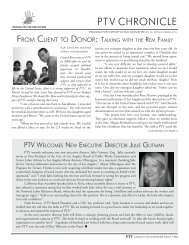Interview with Dr. Jose Quiroga, Page 19 - Program for Torture Victims
Interview with Dr. Jose Quiroga, Page 19 - Program for Torture Victims
Interview with Dr. Jose Quiroga, Page 19 - Program for Torture Victims
You also want an ePaper? Increase the reach of your titles
YUMPU automatically turns print PDFs into web optimized ePapers that Google loves.
Lost Boys were separated from their families and <strong>for</strong>ced to flee their homes during the civil war in South Sudan.<br />
Lokichokio Transit Centre, Kenya. PHOTO: P. MOUMTZIS/UNHCR<br />
“I am glad that we<br />
have our own country.<br />
It is a symbol of the<br />
sacrifice of the lives of<br />
my brother and father”.<br />
the harsh facts: South Sudan has the world’s worst<br />
maternal mortality rate, one child in every nine dies<br />
be<strong>for</strong>e turning five; 30 per cent of those who survive<br />
are underweight or suffer from acute malnutrition.<br />
Two thousand of every 100,000 mothers die during<br />
childbirth because health workers attend only<br />
15 per cent of births. A fifth of children are acutely<br />
malnourished and only 10 per cent of children complete<br />
primary school.<br />
Seventy two per cent of the population is under<br />
30 years old and more than half are under 18. About<br />
45 per cent of South Sudan does not have access to<br />
clean water and 85 per cent of the people have no<br />
access to sanitation.<br />
The chances of a young girl dying during pregnancy<br />
or childbirth are three times more likely than<br />
her completing eight years of basic education.<br />
About 50,000 children have been orphaned in the<br />
last 20 years and 170,000 have lost contact <strong>with</strong><br />
their biological parents.<br />
At the height of the conflict 17,000 children took<br />
up arms and were directly involved in warfare. A<br />
large number of these children have been psychologically<br />
damaged from witnessing violence, or from<br />
the effects of the conflict being so close to home.<br />
Ask Adhieu, another South Sudanese refugee living<br />
in Sydney. <strong>Dr</strong>essed in a light-brown satin dress,<br />
<strong>with</strong> daring blue eye-shadow, her smile froze when I<br />
asked her about her parents. Adhieu cannot remember<br />
how old she was when her father was murdered<br />
in front of her eyes. She lost two brothers to the war<br />
and at the time didn’t know where her mother was.<br />
After the killing, she ran as hard as she could, <strong>with</strong><br />
the people who were crossing the border en masse<br />
into Kenya, leaving everything behind, only looking<br />
<strong>for</strong>ward. She lived in the refugee camp there <strong>for</strong> 10<br />
years be<strong>for</strong>e she came to Sydney.<br />
Today she holds a plump little baby boy, Bior, on<br />
her hips and says, “I will only take him (to South<br />
Sudan) when it is safe. There is fear. Someone can<br />
just come and kill you <strong>for</strong> no reason. First, I will go<br />
and see; only if it is safe, I will take him. But only to<br />
visit, this is his home now”.<br />
She is, however, happy that the years of struggle<br />
have had a tangible result, “I am glad that we have<br />
our own country. It is a symbol of the sacrifice of the<br />
lives of my brother and father”.<br />
South Sudan is a rich country lush <strong>with</strong> fertile<br />
farmland, timber, copper, uranium, other minerals,<br />
and much of the world’s gum Arabic, or acacia gum,<br />
a key ingredient in making soft drink and ice cream,<br />
but still 98 per cent of its domestic revenue comes<br />
from oil.<br />
The third largest producer of oil, it generated about<br />
490,000 barrels a day, and <strong>with</strong> independence, South<br />
Sudan now owns about 75 per cent of it. However,<br />
in the last six years about $6.8 billion of oil revenue<br />
has been unaccounted <strong>for</strong>.<br />
Experts say that if this precious resource were used<br />
effectively, it could be the answer to the country’s<br />
poverty. Depending on the rate of extraction it could<br />
last between eight and 22 years. This means that the<br />
government has a very short time frame to diversify<br />
its economy.<br />
Landlocked and underdeveloped, South Sudan is<br />
dependent on Sudan to transport and refine its oil.<br />
Despite the dismal state of hunger, malnutrition and<br />
disease only four per cent of the budget is dedicated<br />
to health and only 5.6 per cent allotted to education<br />
compared to almost 50 per cent on security, the lion’s<br />
share of South Sudan’s rather large pie. Presently, it<br />
only seems to be protecting the strong.<br />
Southern Kordofan, a contested border state in<br />
north Sudan, witnessed the displacement of 200,000<br />
people after daily bombardments, arbitrary arrests,<br />
extra judiciary killings and a long list of human-<br />
32<br />
REFUGEE TRANSITIONS • ISSUE 26 SUNRISE OVER SOUTH SUDAN 33




